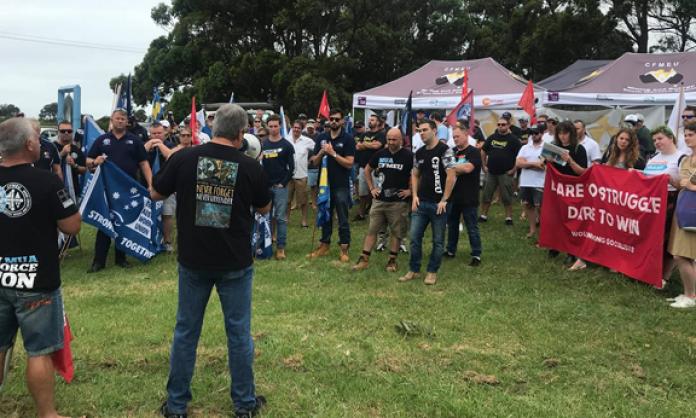Illawarra bosses are on the offensive. Workers at the Port Kembla Coal Terminal have been locked out for four weeks, and are facing dramatic cuts to wages and conditions after the Fair Work Commission terminated their enterprise agreement from next month. Negotiations at the Bluescope steelworks have stalled due to management intransigence, as workers try to reverse the significant pay cuts they copped in their last agreement. More than 100 jobs have been axed at South32’s Appin Mine, and BHP has terminated the contracts of the last two Australian-crewed ships carrying iron ore from the Pilbara to the steelworks, scrapping 80 well-paid unionised jobs.
South Coast Labour Council secretary Arthur Rorris told the Illawarra Mercury, “I’ve been secretary of the labor council for 20 years and in the region longer than that, I can’t recall a time when we’ve had so many different industries being attacked so hard by their employers, by their own bosses”.
An unintended consequence of the bosses’ belligerence – likely motivated by a desire to ram changes through while the Liberals are still in power – is that agreements at several of the region’s largest workplaces are being negotiated at the same time. This creates the potential for legally protected industrial action by workers across different work sites.
Backed by the South Coast Labour Council, representatives from the construction, maritime and other unions in the region have vowed to support each other’s struggles in the coming weeks and months.
A public rally at the Port Kembla Coal Terminal picket line in early February gave a taste of what this might mean. It attracted officials and workers from various industrial disputes around Wollongong, with Rorris telling the crowd “The time for talking is over, the time for action is now”.
Bob Timbs, South Western District vice-president of the construction union, explained that the Port Kembla Coal Terminal board was refusing to meet with union representatives and told the crowd of workers from different industries, “If you guys are marching, we will be marching with you”.
Gary Kean from the maritime union argued that, despite the obvious differences between disputes, “there’s a common thread” connecting “the working class and everything we are up against”. Casualisation, labour hire, non-unionised labour, cuts to working conditions and stagnating wages were amongst the issues Kean identified.
Murray, a striking worker at the coal terminal, told Red Flag, “Everyone’s had enough. Not just the groups of workers here, it’s the groups in town and across the country. Everyone’s had enough of this”.
There was a spirit of defiance at the rally but also an understanding that victory will not come easily. Gavin Bud, an Australian Workers Union delegate from the steelworks, said, “The one thing that’s come to the forefront is that it’s going to be a long hard battle”.
A factor in the workers’ favour, frequently referenced at the rally, is the strong union traditions that characterise Wollongong. Over the last year, the city has seen strikes by university staff, crane drivers, coal miners, early childcare educators, Catholic school teachers, council employees, steel workers and coal terminal workers and campaigns by hospital staff.
Unfortunately, most of those actions have not been enough to force back the bosses’ attacks.
Often this has been because unions haven’t been willing to disrupt scabbing operations (such as at the Port Kembla coal terminal) or shut down production for a significant length of time (such as at the steelworks).
But some disputes have won. Bold decisive strike action by workers at the Wongawilli Colliery earlier in the year resulted in a quick win, propelling them from the position of the most poorly paid coal miners in the Illawarra to some of the best. Two strikes by crane drivers in late 2018 – at Boom Logistics and WGC Cranes – also resulted in victories, both of which involved serious picketing that stopped scabs.
The summer of solidarity is a chance to build on Wollongong’s proud traditions with more victories.











